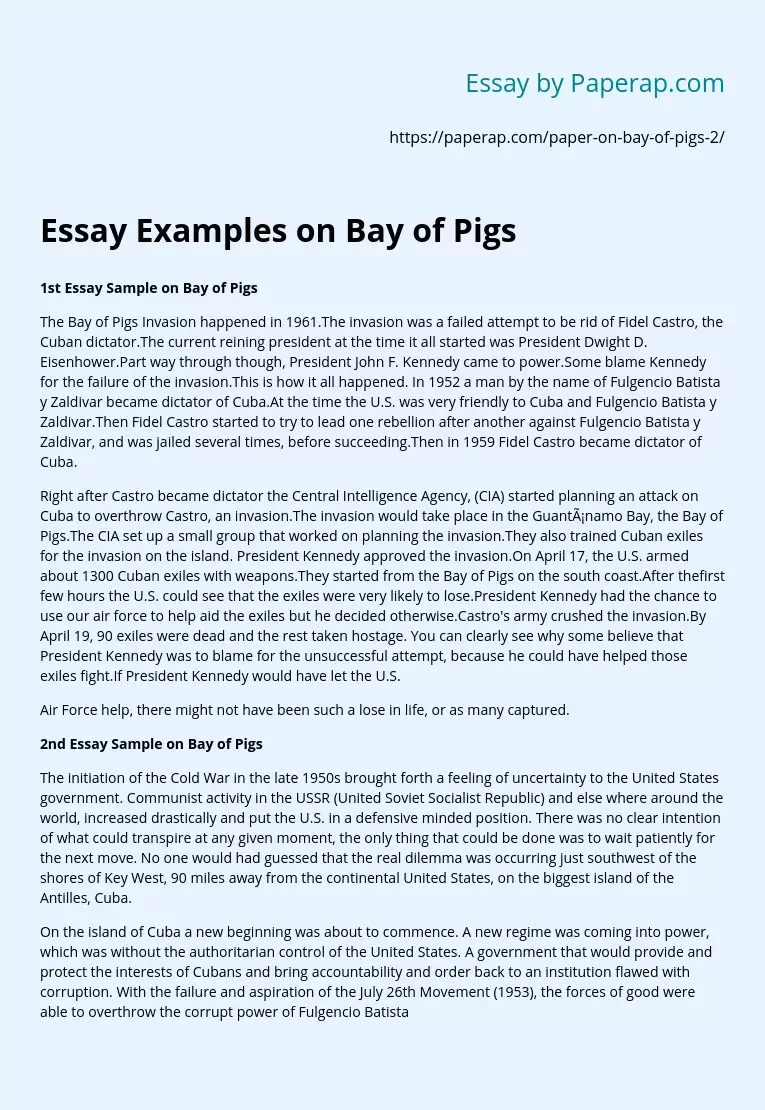Essay Examples on Bay of Pigs
The following sample essay on Essay Examples on Bay of Pigs about Fidel Castro, the Cuban dictator.
The Bay of Pigs Invasion happened in 1961.The invasion was a failed attempt to be rid of Fidel Castro, the Cuban dictator.The current reining president at the time it all started was President Dwight D. Eisenhower.Part way through though, President John F. Kennedy came to power.Some blame Kennedy for the failure of the invasion.This is how it all happened. In 1952 a man by the name of Fulgencio Batista y Zaldivar became dictator of Cuba.
At the time the U.S. was very friendly to Cuba and Fulgencio Batista y Zaldivar.Then Fidel Castro started to try to lead one rebellion after another against Fulgencio Batista y Zaldivar, and was jailed several times, before succeeding.Then in 1959 Fidel Castro became dictator of Cuba.
Right after Castro became dictator the Central Intelligence Agency, (CIA) started planning an attack on Cuba to overthrow Castro, an invasion.
The invasion would take place in the Guantánamo Bay, the Bay of Pigs. The CIA set up a small group that worked on planning the invasion. They also trained Cuban exiles for the invasion on the island. President Kennedy approved the invasion. On April 17, the U.S. armed about 1300 Cuban exiles with weapons.They started from the Bay of Pigs on the south coast.After thefirst few hours the U.S. could see that the exiles were very likely to lose. President Kennedy had the chance to use our air force to help aid the exiles but he decided otherwise.
Castro’s army crushed the invasion. By April 19, 90 exiles were dead and the rest taken hostage. You can clearly see why some believe that President Kennedy was to blame for the unsuccessful attempt, because he could have helped those exiles fight. If President Kennedy would have let the U.S. Air Force help, there might not have been such a lose in life, or as many captured.
The initiation of the Cold War in the late 1950s brought forth a feeling of uncertainty to the United States government. Communist activity in the USSR (United Soviet Socialist Republic) and else where around the world, increased drastically and put the U.S. in a defensive minded position. There was no clear intention of what could transpire at any given moment, the only thing that could be done was to wait patiently for the next move. No one would had guessed that the real dilemma was occurring just southwest of the shores of Key West, 90 miles away from the continental United States, on the biggest island of the Antilles, Cuba.
On the island of Cuba a new beginning was about to commence. A new regime was coming into power, which was without the authoritarian control of the United States. A government that would provide and protect the interests of Cubans and bring accountability and order back to an institution flawed with corruption. With the failure and aspiration of the July 26th Movement (1953), the forces of good were able to overthrow the corrupt power of Fulgencio Batista in late December of 1958.1 The person in charge of these revolutionary acts was a man by the name of Fidel Castro. Atfirst, Castro was not seen as a threat to U.S. control of Cuba. He was seen more like a temporary set back that eventually would be eliminated.Such believe in that ideology was apparent in President Dwight Eisenhower, who on April 1959 refused to meet and accept Castro as the new ruler of Cuba. But in time all of this came to a drastic change. During a public speech in 1960, Castro announced that he was a Marxist-Leninist, surprising many of his followers and most of all the United States. The U.S. government and President Eisenhower were outraged. This was a devastating blow to the U.S. policy toward Communism, in which it is believed that the United States should do anything in its power to rid the world of Communist rule.
In any military operation there always have to be a plan drawn up to support the operation. So why was the Bay of Pigs operation such a failure? Some of the questions I will focus on is what and how much of a role did the CIA, the Joint Chiefs of Staff and the Kennedy administration plays in the disaster.Kennedy came to the White House with a true belief in democracy and the American dream. Kennedy’s background was one of wealth and prestige. Fidel Castro took control of Cuba by force.
When there is a bloody revolution or change it catches the attention of the U.S. State department, especially when it is only ninety miles away from the coast of The Cold War was in full swing. With Castro in power and so close to the United States this seemed like and clear and present danger to the United States. At this time President-elect Kennedy Start’s to receive daily intelligence briefs on Castro’s movements within the country.The United States had been among thefirst nations to recognize the new Castro regime. It maintained a large imposing embassy on the Malecon, Havana’s beautiful waterfront drive. From this embassy, the U.S. State Department foreign service officers and the Central Intelligence Agency were issuing countless messages to Washington concerning the deteriorating state of affairs within Cuba.
While the foreign service officers and the CIA were in substantial agreement in their judgment and evaluation of the Castro regime, the men in Washington to whom the The CIA, very early in the game, reported on Castro’s Communist learning’s and the Communist backgrounds of some of his advisers, but the State Department, led by chief of Latin American affairs, Roy Rubottom, presented only glowing reports on the new Cuban premier. In fact, Rubottom was emphatic in his support of Castro.
Essay Examples on Bay of Pigs. (2019, Oct 10). Retrieved from https://paperap.com/paper-on-bay-of-pigs-2/

